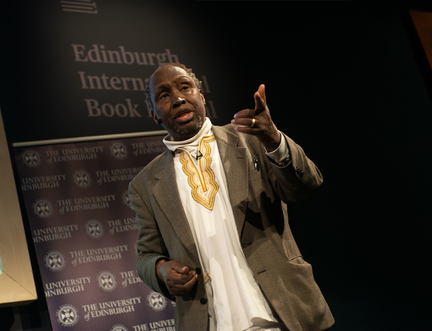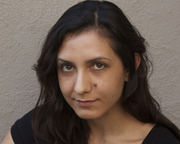More articles Sunday 12 August 2018 1:00pm
Kenyan Novelist Ngũgĩ wa Thiong'o Speaks at the Book Festival

Kenya and other African nations are educating 'aliens in their own countries', according to the revered Kenyan author and playwright Ngũgĩ wa Thiong'o.
Returning to the Book Festival after 12 years, in what Festival Director Nick Barley described as a keynote event, Nobel Prize favourite Thiong’o pointed out that many of those studying Africa today have read nothing in any indigenous African languages.
Suggesting that you would expect an expert in French culture to have at least some knowledge of the French language, he highlighted a linguistic hierarchy which afforded western perspectives and languages a privileged position. 'What we accept in Africa is an absurdity in every other situation,' he said. 'It is an absurdity that has become the norm.'
He highlighted how numerous African nations were educating people to become foreigners in their own countries; for example, doctors unable to speak to their patients in their native languages. 'This has to end somewhere,' he said. 'If we add other languages, that is a good thing. The way we’re going about it just now is killing the continent.'
The hierarchies are, of course, a legacy of the continent’s colonial past. 'It is nothing to do with whether a language is ‘good’ or ‘bad’,' Thiong’o insisted. 'Every language has its own musicalities; English, Gaelic, Japanese, Swahili and so on. What brings about the situation is nothing to do with the capacities of language; it’s a power relationship, an imperial colonised relationship. In Africa, the humiliation of colonised languages, the criminalisation of the languages of the dominated, brought about a mental condition where the language of the conqueror seemed to be so natural, so normal and instinctive. This is what we have to change.'
Thiong’o is a great proponent of multilingualism, which he describes as the 'oxygen' of cultures. 'We must free ourselves of the tyranny of monolingualism. I talk about monolingualism as the carbon monoxide of culture. If you know all the languages of the world, and don’t know your mother tongue, that is enslavement. If you know your mother tongue and add to it all the languages of the world, that is empowerment.'
Despite the current situation, Thiong’o remains optimistic about the future, and the work being done to support indigenous languages around the world.
Bringing the event to a close, chair Dr Thomas Molony, Director of the Centre of African Studies at the University of Edinburgh, asked Thiong’o to give a one-word answer to the question of what keeps him going.
His answer? 'Fight!'
Look, Listen & Read

Reviews and Interviews with Appearing Authors
Mon 06 August 2018
- 2026 Festival:
- 15-30 August
Latest News
 Major new partnership with Celtic Connections
Major new partnership with Celtic Connections



